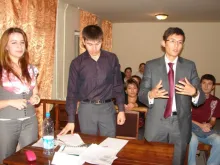The United Nations Development Programme (UNDP) and the United Nations Volunteers (UNV) programme have created a legal support website in Tashkent which is run by pro-bono legal clinicians and is designed to help the citys residents obtain the legal advice and support they require.
While a number of legal clinics are currently operating in the city, staffed by law students with the support of UNDP and their academic institutions, they lack the resources and tools required to address the needs of their clients.
The need for this website became apparent while UNDP and UNV were working with the legal clinics within the Good Governance programme. It was determined that while the clinics offered important services to their communities, their limited resources made it difficult for them to address their clients needs.
A primary concern was that the clinics relied on outdated paperwork systems, which meant that prioritizing clients was a difficult task.
UNDP and UNV consequently decided to develop a method that could be used to streamline the client registration process. We thought a website would be a good solution, as it would not only enhance the clinics impact but would also make it more efficient, more open, more transparent and more available to people who need services, said UNV Programme Officer Marc Liberati.
The legal website provides a registration system for the legal clinics. Clients are able to sign up on the website and join an electronic queue. The legal staff at the clinics are then able to review the incoming registrations, contact clients whose problems can be addressed, and then arrange appointments as necessary.
The website also serves as a legal resource for visitors, offering basic information which can allow people to solve certain issues by themselves, and explaining what the legal clinics can and cannot do. These features allow the legal clinics to run as smoothly and effectively as possible.
While the website was originally set up by UNDP, it is now entirely run and maintained by the legal clinics.
While the website and legal clinics are designed to directly benefit individuals who require legal advice, they can also provide law students with a unique form of professional experience. Law students can develop a greater sense of social responsibility by running legal clinics and the website.
Working for the service will be a good opportunity for students, an exposure that will hopefully lead to a life-long commitment, said Marc Liberati.
We hope that they will remember their volunteering experience during their future careers, and that they will think about giving back to their communities. Students should see that law is ultimately about one core idea to ensure justice while protecting the weakest members of society.

